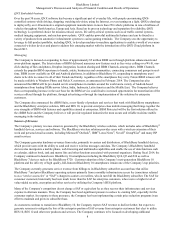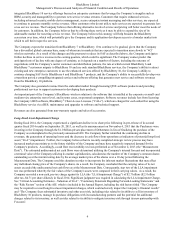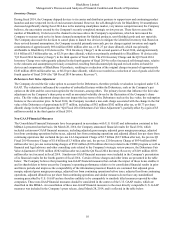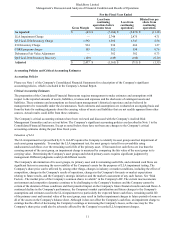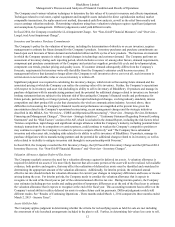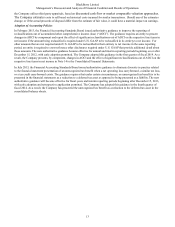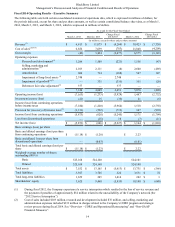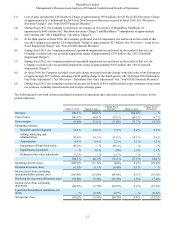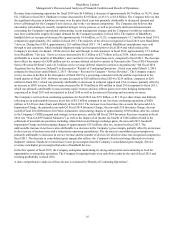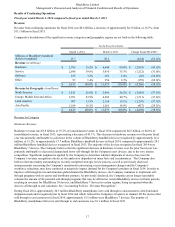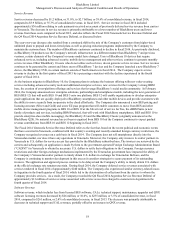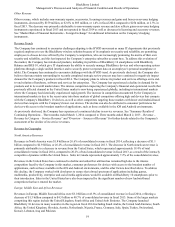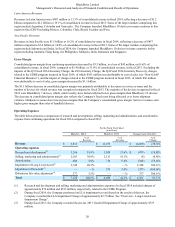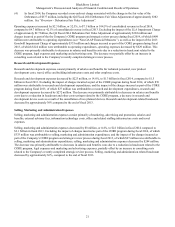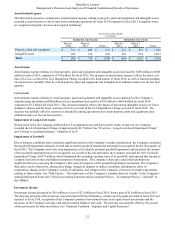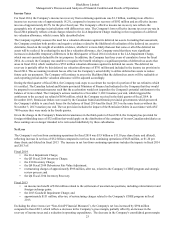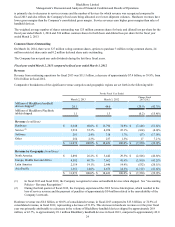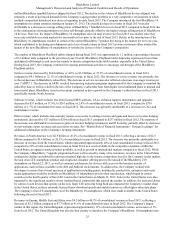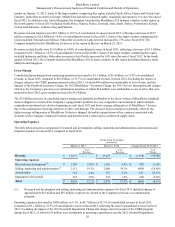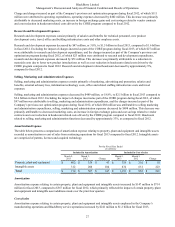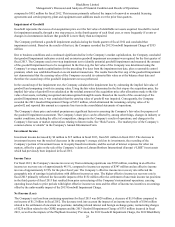Blackberry 2014 Annual Report Download - page 148
Download and view the complete annual report
Please find page 148 of the 2014 Blackberry annual report below. You can navigate through the pages in the report by either clicking on the pages listed below, or by using the keyword search tool below to find specific information within the annual report.BlackBerry Limited
Management’s Discussion and Analysis of Financial Condition and Results of Operations
18
Service Revenue
Service revenue decreased by $1.2 billion, or 31.0%, to $2.7 billion, or 39.6% of consolidated revenue, in fiscal 2014,
compared to $3.9 billion, or 35.3% of consolidated revenue, in fiscal 2013. Service revenue in fiscal 2014 included
approximately $36 million relating to cash payments received on account of previously deferred service revenue from carriers
in Venezuela. The decrease in service revenue is primarily attributable to a lower number of BlackBerry users and lower
revenue from those users compared to fiscal 2013, and also reflects the Fiscal 2014 Venezuela Service Revenue Deferral and
the Q4 Fiscal 2014 Argentina Service Revenue Deferral, as discussed below.
The year-over-year decrease also resulted from a continued shift in the mix of the Company’s customers from higher-tiered
unlimited plans to prepaid and lower-tiered plans as well as pricing reduction programs implemented by the Company to
maintain the customer base. The number of BlackBerry customers continued to decline in fiscal 2014. As previously disclosed,
as BlackBerry 10 products use the Company's network infrastructure in a different manner than BlackBerry 7 and previous
versions, certain elements of the Company's revenue model have changed. Users of Blackberry 10 devices that require
enhanced services, including advanced security, mobile device management and other services, continue to generate monthly
service revenue. Other BlackBerry 10 users who do not utilize such services, do not generate service revenue. Service revenue
continues to be generated by current and future users of BlackBerry 7 devices and the Company launched a new BlackBerry 7
device, the BlackBerry 9720, in certain markets outside of North America in fiscal 2014. The Company expects service
revenue to decline in the first quarter of fiscal 2015 by a percentage consistent with the decline experienced in the fourth
quarter of fiscal 2014.
As the business migrates to BlackBerry 10, the Company plans to enhance the business offering with new value-creating
services including advanced security tools and additional enterprise services, new services for the Company’s strong BBM
base, the creation of cross-platform offerings and services that leverage BlackBerry’s social media community. In February
2014, the Company announced new enterprise solutions, partnerships and smartphone models, including the next generation of
BES (BES 12) that will unify BES 10 and BES 5 onto one platform. BES 12 will enable organizations to develop enterprise-
grade applications that are quickly deployed to BlackBerry smartphones and other mobile devices and provide customers with
the ability to move securely from on-premise to the cloud effortlessly. The Company also announced a new BES pricing and
licensing structure (Silver and Gold) and a new EZ pass program that will enable customers to move from BES and other
mobile device management programs to BES 10 or BES 12 at the Silver level of service for free, the eBBM Suite (a new
family of products and services, including BBM Protected, that will work with BlackBerry smartphones, BES and BES 10 to
provide enterprise-class mobile messaging), the BlackBerry Z3 and the BlackBerry Classic (originally announced as the
BlackBerry Q20). No material revenue has yet been recognized from BES 10 but the Company continues to expect gradual
revenue contributions from BES 10 and BES 12 beginning in fiscal 2015.
The Fiscal 2014 Venezuela Service Revenue Deferral refers to the fact that, based on the recent political and economic events
that have occurred in Venezuela, combined with that country's existing and recently amended foreign currency restrictions, the
Company recognized revenues on a cash basis in fiscal 2014. The Company does not sell smartphones directly into the
Venezuelan market, nor does it have any operations in Venezuela. Moreover, the Company only invoices its carrier partners in
Venezuela in U.S. dollars for service access fees provided to the BlackBerry subscriber base. The invoices are reviewed by the
carriers and subsequently, an application is made by them to the government-operated Foreign Exchange Administration Board
(“CADIVI”) in Venezuela to obtain the necessary U.S. dollars to settle their obligations to the Company. Foreign currency
restrictions and other foreign exchange mechanisms implemented by the Venezuelan government have impacted the ability of
the Company’s Venezuelan carrier partners to timely obtain U.S. dollars in exchange for Venezuelan Bolivars, and the
Company is continuing to monitor development in this area as it considers strategies to secure payment of its outstanding
invoices. The application and approval process continue to be delayed and the Company’s ability to timely obtain U.S. dollars
at the official exchange rate remains uncertain. During fiscal 2014, the Company deferred service revenues associated with
services rendered in fiscal 2014 of approximately $240 million. The Company also experienced similar currency-related issues
in Argentina in the fourth quarter of fiscal 2014, which led to the deterioration of collections from the carriers to whom the
Company provides services. As a result, the Company recorded the Q4 Fiscal 2014 Argentina Service Revenue Deferral of
approximately $13 million of service revenue associated with service access fees charged to customers in Argentina in the
fourth quarter of fiscal 2014.
Software Revenue
Software revenue, which includes fees from licensed BES software, CALs, technical support, maintenance, upgrades and QNX
software licensing revenues decreased by $26 million, or 10.0%, to $235 million, or 3.5% of consolidated revenue, in fiscal
2014, compared to $261 million, or 2.4% of consolidated revenue, in fiscal 2013. The decrease was primarily attributable to
decreases in technical support and CAL revenues, partially offset by an increase in QNX revenue.


